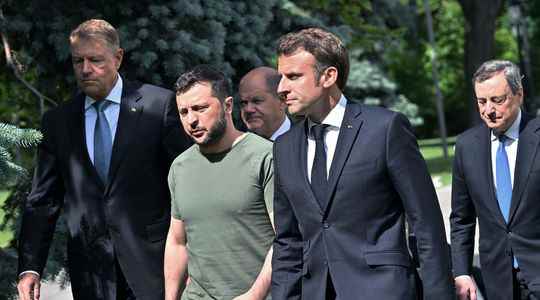Emmanuel Macron, Olaf Scholz and Mario Draghi on the road to kyiv, in shirtsleeves, in a style wagon Orient-Express outdated. The photo, which seems to have come out of an Agatha Christie novel or a 1930s Hitchcock film, will be remembered for its vintage and strangely quirky charm, as the landscapes of a country pass by. under the bombs. The day of June 16, meanwhile, is already historic. A French President, a German Chancellor, an Italian Prime Minister, at the head of Europe’s three leading economic powers, came to bring Volodymyr Zelensky, President of Ukraine, the fraternal support of a European Union confronted for the first time of its history, on its continent and at its gates, to an unprecedented attack on a sovereign country by a nuclear power.
They came at a time when history is changing: after four months of war and incessant shelling by the Russian army, the Ukrainians are on the verge of losing the Donbass region, in the east of the country, and perhaps their access to the seas up to the Moldovan border, to the south. They have come to represent a Europe united and committed for the first time militarily in the face of an enemy which, by invading Ukraine, a non-EU country, is attacking despite everything a part of itself and the values that she defends.
By his delirious desire to “reconquer” the territories of the former Russian-Soviet Empire, contrary to the international treaties on the intangibility of borders signed by Russia itself, Vladimir Putin has enabled the European Union to become the political union it did not know how to be. It was in her name that the French, German and Italian leaders came to tell Ukraine, clearly and firmly, that she was one of them. They announced new deliveries of heavy weapons and pleaded for the recognition of its status as an “immediate” candidate for the EU, preceding the Commission’s recommendation in this direction and its very probable validation by the European Council of 23 and 24 June. “Today is a truly historic day, said President Zelensky. Ukraine felt the support of four Europeans at once.”
The fourth man
Because there was a fourth. A fourth European leader, invisible in the photo of the train, who joined the other three in kyiv because he was arriving by another route. The lesser known, less powerful Romanian President Klaus Iohannis, sometimes forgotten in the commentary, was there to give a symbolic Eastern European touch to the trio of old Europe… who needed it. For the EU, united as it had never been in its financial, military, civil and humanitarian support for Ukraine, has politically revealed a new dividing line.
All EU countries do not start from the same story: on the one hand, the border residents of Russia, Baltics and Poles in the lead, former members of the Soviet Union or the Warsaw Pact who have been warning since the beginning of the 2000 on the imperialist objectives of Vladimir Putin, having suffered in their flesh from Russian oppression; on the other, the preserved countries, which fell on the right side of the division of Yalta after the Second World War – Germany having experienced both sides. The former, like President Zelensky, felt Emmanuel Macron’s insistence, insistently repeated by him, “not to humiliate Russia” – an unsuitable phrase that left its mark – as a deep wound. The quartet’s visit to kyiv allowed both the German and the Italian to be forgiven for their procrastination linked to their excessive dependence on the russian gas, and the French to be less ambiguous vis-à-vis Putin. End of “at the same time”.
Ukrainians are Europeans. They have proven for twenty years, by their successive elections, their demonstrations repressed in blood, their fights against the armed militias of Donbass and now by their heroic resistance to a criminal war, their relentless will to belong to the camp of the liberal democracies. Ukraine is certainly far from reaching the legal and economic criteria necessary to integrate the single market. It is nonetheless embarrassing that we, Europeans of comfort, have hesitated to accept the candidacy of a nation more European than we ourselves are. This status of “immediate candidate”, it was time. The Ukrainians are dying for our freedom as much as for theirs, for the future of Europe, for us.
